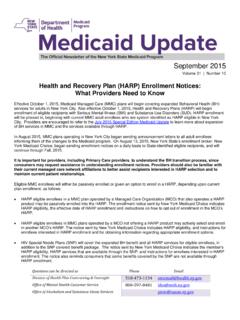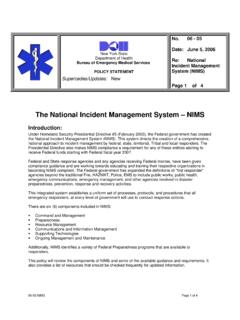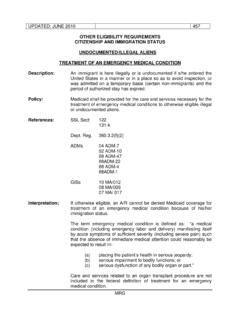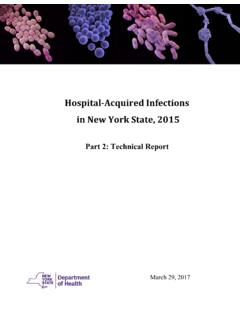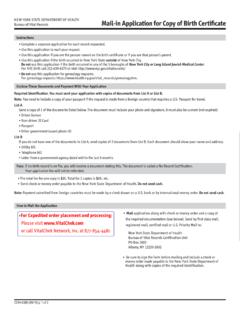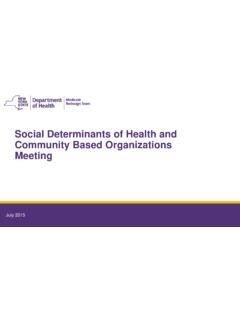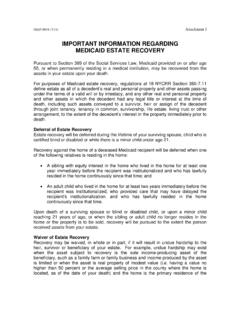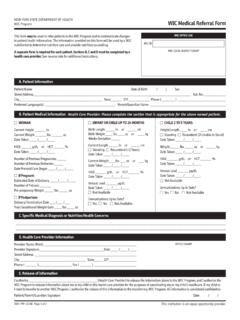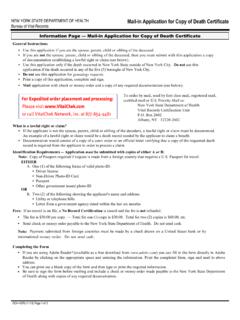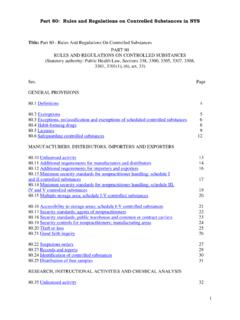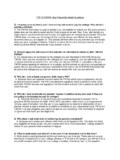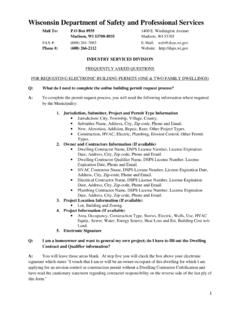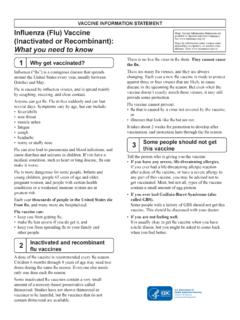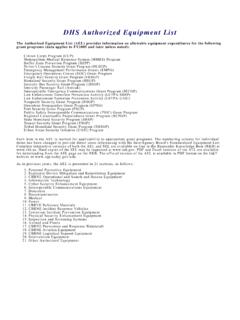Transcription of Additional Frequently Asked Questions About School ...
1 Additional Frequently Asked Questions About School Vaccination Requirements October 4, 2019. Definitions for School vaccination requirements can be found at: What vaccines are due within the first 14 days of School ? Children must receive all first age/grade level appropriate doses, or overdue follow-up doses if they already received prior doses in a series, within 14 days of the from the first day of instruction for the School year , and must provide evidence of age appropriate appointments for the next follow-up doses, in accordance with the ACIP schedule, within 30. days of the first day of attendance. All required vaccine schedules must be completed in accordance with the ACIP schedule. Here is a link for the routine immunization and catch up schedules: When should a child who has received at least the first dose of all required immunization series be excluded? Schools may permit a child who has received at least the first dose of all required immunization series to attend School so long as the child remains in process.
2 A child must receive the subsequent dose of each vaccine series within 14 days after the minimum interval identified by the ACIP catch up schedule, or the child is no longer in process. For example, a child receives their first dose on September 18, 2019 (Day 0), and is not due for the next dose for 28 days following the first dose (October 16, 2019, Day 28). The child is due for the next dose on October 16, 2019. October 16 is the date of the missed dose. A child must receive the subsequent dose of each vaccine series within 14 days after the minimum interval identified by the ACIP catch up schedule (October 16 - October 30, 2019). If the child has still not received the subsequent dose, the child is over-due and no longer in process on October 31. Can a child get multiple live vaccine immunizations on the same day? Yes. Multiple live vaccines may be given on the same day. In the case of live vaccines, however, a child should wait 28 days after one live vaccine administration before receiving a different live vaccine, if the vaccines were not given on the same day.
3 The child remains in process during these 28 days. This exception only applies to live vaccines (MMR, MMRV, or Varicella). What timeframe is required for follow-up doses of vaccines? Children who are not fully immunized can only continue to attend School if they are in the process of completing the immunization series based on the Advisory Committee on Immunization Practices Recommended Child and Adolescent Immunization Schedule for ages 18 years or younger. If a child does not receive subsequent doses of vaccine in an immunization series according to the age appropriate ACIP catch-up schedule, including at appropriate intervals, the child is no longer in process and should be excluded from School within 14 days after the missed dose, if not otherwise exempt in accordance with 10 NYCRR Have the rules around the due dates for School vaccines changed this summer? No, the due dates for receiving School vaccines have not changed.
4 Vaccines must still be received in accordance with the ACIP schedules. Note that 10 NYCRR 66 defines in process and establishes the due dates for receiving vaccines. Can a child be re-excluded throughout the year for over-due doses? Yes. If a child does not receive subsequent doses of vaccine within 14 days after the minimum interval identified by the ACIP catch up schedule, the child is no longer in process. Can a child remain in School so long as they show that they have made appointments for all required follow-up doses? Yes. So long as the appointment to receive subsequent doses of vaccine is not later than 14. days after the minimum interval identified by the ACIP catch up schedule. Can a child remain in School so long as they show that they have made appointments for all required follow-up doses spread throughout the School year until June 30, 2020? No, not necessarily, because appointments to receive subsequent doses of vaccine must not be later than 14 days after the minimum interval identified by the ACIP catch up schedule.
5 When a parent has a good faith belief that a child is immunized against a disease but there is no acceptable evidence of immunity, what should the School do? When there is no acceptable evidence of immunity, serologic tests may be requested for the following disease: measles, mumps, rubella, varicella, and hepatitis B. (Serologic tests for all three types of polio that were submitted to a School prior to September 1, 2019, are acceptable evidence of the child's immunization against polio, but serologic tests for polio can no longer be requested to provide evidence of immunization against polio.) Laboratory confirmation of disease may be requested for measles, mumps, rubella, or varicella. Such positive serologic tests or laboratory confirmation of disease are acceptable evidence of the child's immunization. Children lacking evidence of immunity to DTaP, Tdap, polio or (for applicable grades). meningococcal disease, Haemophilus influenzae type B disease or pneumococcal disease will need to complete the vaccination series even if the parents believe the child may have previously been immunized against these diseases, unless the child has a medical exemption to those vaccines.
6 When is a child who is obtaining serologic tests in process ? A child who is obtaining serologic tests is in process within 14 days of when such testing is requested. The School may permit the child to attend School so long as the child receives a positive serologic test (for measles, mumps, rubella, varicella, or hepatitis B), or laboratory confirmation of disease (for measles, mumps, rubella, or varicella) within 14 days. What if the serologic test or laboratory confirmation of disease test is negative? When a serologic test or laboratory confirmation of disease test is negative or equivocal, the School must notify the parent or guardian of the child to complete, or begin completion, of the immunization series for all disease which test negative. The child must provide the School with a certificate of immunization documenting that the child has been vaccinated as indicated in the ACIP Child and Adolescent Immunization Schedule for ages 18 years or younger within 30 days of notification of the parent/guardian to complete, or begin completion, of the immunization series.
7 A principal or person in charge of a School shall not admit a child to School unless the School has been furnished with a certificate of immunization or documentation that the child is in process. If a child does not receive doses of vaccine in an immunization series according to the ACIP schedule, including at appropriate intervals, the child is no longer in process and may be excluded from School within 14 days of the missed dose. What does the June 30, 2020 date mean in the law? Until June 30, 2020, a child can attend School if they receive the first age-appropriate dose in each immunization series within 14 days from the first day of School attendance and can show within 30 days that they have scheduled appointments for required follow-up doses within 14 days after the minimum interval identified by the ACIP catch-up schedule. This allows students who were not fully up-to-date on their vaccinations on June 13, 2019, when the law was enacted, to continue to attend School , as long as they receive the first age- appropriate dose in each immunization series within 14 days from the first day of School attendance and can show within 30 days that they have scheduled age-appropriate appointments for required follow-up doses in accordance with the ACIP catch-up schedule.
8 By June 30, 2020, all students who were attending School at the time the law was enacted are expected to be fully up-to-date on their required immunizations and therefore the 30-day extension allowing such children to be enrolled as long as they have scheduled appointments to complete their immunization series according to the ACIP schedule will expire. Does my child have until June 30, 2020 to catch up on all required vaccinations? No. A child must receive the subsequent dose of each vaccine series within 14 days after the minimum interval identified by the ACIP catch up schedule, or the child is no longer in process. Can a child remain in School while a medical exemption is under review? A child who has submitted a medical exemption within the first 14 days of School may attend School while the medical exemption is being reviewed. A valid medical exemption: Is submitted on a signed, completed medical exemption form issued by NYSDOH or NYC Department of Education.
9 Specifies which immunizations may be detrimental to the child's health;. Contains sufficient information to determine if a medical contraindication to a specific immunization exists; and Specifies the length of time the immunization is medically contraindicated. The principal or person in charge of the School may require Additional information supporting the exemption. Medical exemptions must be reissued annually.
